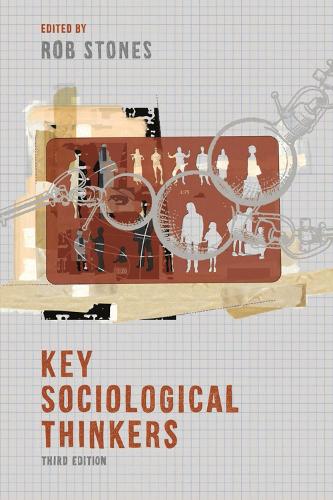
Key Sociological Thinkers
(Hardback, 3rd edition)
Publishing Details
Key Sociological Thinkers
By (Author) Professor Rob Stones
Contributions by Bob Jessop
Contributions by Craig Browne
Contributions by Michele Barrett
Contributions by Ted Benton
Contributions by Lawrence Barth
Contributions by Tony Blackshaw
Contributions by Filipe Carreira da Silva
Contributions by John Heritage
Contributions by Robert J. Holton
Bloomsbury Publishing PLC
Red Globe Press
2nd August 2017
3rd edition
United Kingdom
Classifications
Professional and Scholarly
Non Fiction
Anthropology
301
Physical Properties
Hardback
478
Width 155mm, Height 235mm
929g
Description
The third edition of this popular and established core textbook provides an invaluable guide to 24 of the most influential thinkers in Sociology. Written by leading academics in the field, Key Sociological Thinkers provides a clear and contextualised introduction to classical and contemporary theory. Each chapter offers an insightful assessment of a different theorist, exploring their lives, works and legacies, and in a much-valued 'Seeing Things Differently' section authors demonstrate how each thinkers ideas can be used to illuminate aspects of social life in new ways. With frameworks for deep learning around group discussion, this continues be an essential text for undergraduate and postgraduate modules on sociological and social theory. New to this Edition: - Four new chapters, on Mead, Du Bois, Latour and Alexander - Five chapters by new authors on existing key thinkers: Durkheim, Merton, Goffman, Bourdieu, and Giddens - A major new introduction - An updated, structured and annotated Further Reading section for each thinker - Extended accounts of 13 additional thinkers who have influenced, or been influenced by, the key thinkers
Reviews
A text with the conceptual and pedagogical qualities of Key Sociological Thinkers comes around only once every academic generation, presenting ideas in a way that aids students in developing theoretical literacy and including exercises to help apply theory to real-world cases. * Javier Trevio, Wheaton College, USA *
Author Bio
Rob Stones is Professor of Sociology in the School of Social Sciences and Psychology, Western Sydney University. He has a broad interest in social, sociological and political theory, their application in empirical research, and their importance to serious reflection on public issues. He has pioneered the version of structuration theory known as strong structuration theory (SST), designed to guide empirical case study research and adopted in diverse areas. His books include Sociological Reasoning (1996), Structuration Theory (2005), and Why Current Affairs Needs Social Theory (2015). He is the editor of two book series with Palgrave Macmillan, Themes in Social Theory and Traditions in Social Theory.
